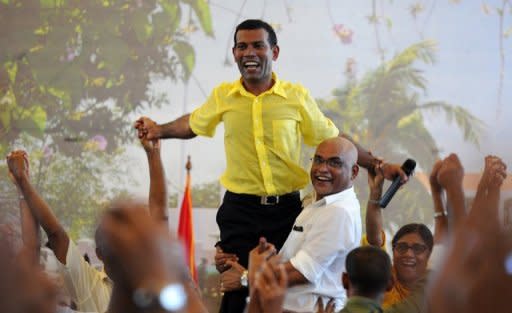Fall of Maldives president not a 'coup': panel
A Commonwealth-backed investigation in the Maldives on Thursday dismissed claims that a coup forced Mohamed Nasheed from the presidency in February and declared it was a legitimate transfer of power. The panel's report concluded that Nasheed, who alleged he was ousted in a coup, had resigned voluntarily -- a judgment promptly rejected by his party which staged another street protest and clashed with police. The Commission of National Inquiry (CoNI), consisting of four nationals named by political parties and a Singaporean judge nominated by the Commonwealth, found the change of president was "legal and constitutional". "The resignation of President Nasheed was voluntary and of his own free will," it said in a 62-page report which was also signed by a Canadian and New Zealander who functioned as observers for the UN and the Commonwealth. Nasheed's departure "was not caused by any illegal coercion or intimidation", the report said. Nasheed has previously told his supporters that it would be legitimate to challenge the current government through "street action" if the report rejected his claims that he was overthrown in a military and police coup. Nasheed's Maldivian Democratic Party (MDP) activists took to the streets Thursday night in a repeat of protests that have gripped the capital Male for the past six months. Police Superintendent Abdulla Nawaz said they arrested at least 23 activists. "They have assaulted one of our officers and damaged the windows of a police vehicle," Nawaz said when contacted by telephone. MDP activists said about 50 of their supporters had been arrested within a two-hour period and accused police of clamping down on their nightly street demonstration. "We will keep up our campaign to press for early elections," MDP spokesman Hamid Abdul Ghafoor told AFP by telephone. He rejected the CoNI report as a "total outrage". However, the Commonwealth, the United Nations and the United States welcomed the report. "We urge all parties to respect those findings, to exercise restraint, obey the rule of law, and continue to express themselves in a peaceful and non-violent manner," the US state department said in a statement. UN Secretary General Ban Ki-moon also urged all parties to accept the findings of the report, while raising concerns at the prospect of renewed political tensions should that not happen. Commonwealth Secretary-General Kamalesh Sharma said that "the task ahead for all Maldivians must be to strengthen democracy". "An atmosphere of peace and public order is essential for that to happen," he said. Nasheed's nominee on the CoNI panel resigned late on Wednesday saying that it had ignored vital evidence, including photographs and videos. The Maldives -- a string of islands set in the Indian Ocean -- relies on luxury resorts that attract wealthy tourists from around the world to its palm-fringed beaches, pristine seas and renowned diving. This year's upheavals have not directly affected the resorts but have damaged the nation's image as a tropical paradise. The CoNI report also noted acts of "police brutality" over the three days in February when Nasheed left office, and it called for further inquiries. President Mohamed Waheed, who took over from Nasheed and was formerly his deputy, had earlier announced he would back its verdict. One of his ministers, Mohamed Hussain Shareef, said Thursday that the government respected the panel's work and added that police would ensure that no civil unrest erupted at any demonstration by opposition activists. Shareef said several unnamed countries had cut off aid to the Maldives and shunned high-level contacts over Nasheed's coup claims. "The CoNI process is the catalyst for further engagement with the international community," Shareef, who is visiting Sri Lanka, told reporters. President Waheed has rejected international calls for early elections, saying it was not practical to hold a vote before July 2013 in the Islamic state of 330,000 Sunni Muslims.



